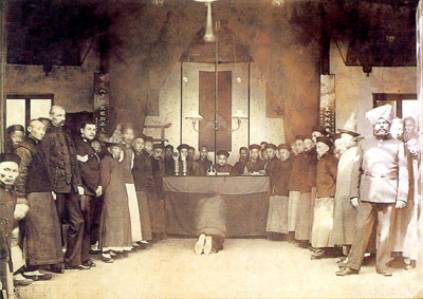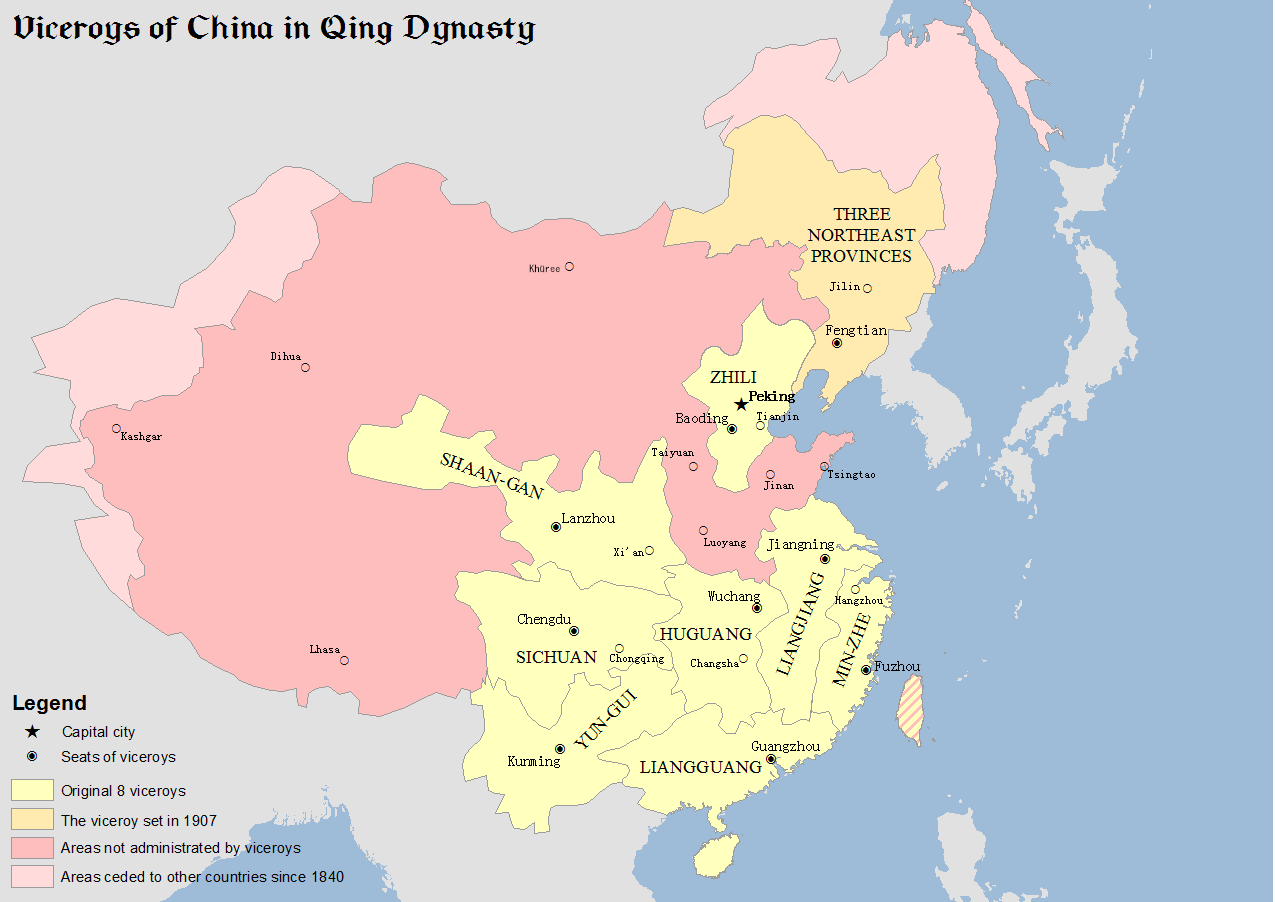|
Treaty Of Wangxia
The Treaty of Wanghia (also known as the Treaty of Wangxia; Treaty of peace, amity, and commerce, between the United States of America and the Chinese Empire; ) was the first of the unequal treaties imposed by the United States on China. As per the terms of the diplomatic agreement, the United States received the same privileges with China that Great Britain had achieved under the Nanjing Treaty in 1842. The United States received additional privileges as well, including the right to cabotage on preferential terms and the expansion of extraterritoriality. Imperial China's Qing dynasty signed the treaty with the United States on July 3, 1844, in the Kun Iam Temple. The treaty was subsequently passed by the U.S. Congress and ratified by President John Tyler on January 17, 1845. The Treaty of Wanghia was formally in effect until the signing of the 1943 Sino-American Treaty for the Relinquishment of Extraterritorial Rights in China. Name of the Treaty The treaty was named after a ... [...More Info...] [...Related Items...] OR: [Wikipedia] [Google] [Baidu] |
Unequal Treaty
Unequal treaty is the name given by the Chinese to a series of treaties signed during the 19th and early 20th centuries, between China (mostly referring to the Qing dynasty) and various Western powers (specifically the British Empire, France, the German Empire, the United States, and the Russian Empire), and the Empire of Japan. The agreements, often reached after a military defeat or a threat of military invasion, contained one-sided terms, requiring China to cede land, pay reparations, open treaty ports, give up tariff autonomy, legalise opium import, and grant extraterritorial privileges to foreign citizens. With the rise of Chinese nationalism and anti-imperialism in the 1920s, both the Kuomintang and the Chinese Communist Party used the concept to characterize the Chinese experience of losing sovereignty between roughly 1840 to 1950. The term "unequal treaty" became associated with the concept of China's " century of humiliation", especially the concessions to foreign powers ... [...More Info...] [...Related Items...] OR: [Wikipedia] [Google] [Baidu] |
Western World
The Western world, also known as the West, primarily refers to the various nations and state (polity), states in the regions of Europe, North America, and Oceania.Western Civilization Our Tradition; James Kurth; accessed 30 August 2011 The Western world is also known as the Occident (from the Latin word ''occidēns'' "setting down, sunset, west") in contrast to the Eastern world known as the Orient (from the Latin word ''oriēns'' "origin, sunrise, east"). Following the Discovery of America in 1492, the West came to be known as the "world of business" and trade; and might also mean the Northern half of the North–South divide, the countries of the ''Global North'' (often equated with capitalist Developed country, developed countries). [...More Info...] [...Related Items...] OR: [Wikipedia] [Google] [Baidu] |
Treaty Ports
Treaty ports (; ja, 条約港) were the port cities in China and Japan that were opened to foreign trade mainly by the unequal treaties forced upon them by Western powers, as well as cities in Korea opened up similarly by the Japanese Empire. Chinese treaty ports The British established their first treaty ports in China after the First Opium War by the Treaty of Nanking in 1842. As well as ceding the island of Hong Kong to the United Kingdom in perpetuity, the treaty also established five treaty ports at Shanghai, Canton (Guangzhou), Ningpo (Ningbo), Foochow ( Fuzhou), and Amoy (Xiamen). The following year the Chinese and British signed the Treaty of the Bogue, which added provisions for extraterritoriality and the most favored nation status for the latter country. Subsequent negotiations with the Americans (1843 Treaty of Wanghia) and the French (1844 Treaty of Whampoa) led to further concessions for these nations on the same terms as the British. The second group of treat ... [...More Info...] [...Related Items...] OR: [Wikipedia] [Google] [Baidu] |
Extraterritoriality
In international law, extraterritoriality is the state of being exempted from the jurisdiction of local law, usually as the result of diplomatic negotiations. Historically, this primarily applied to individuals, as jurisdiction was usually claimed on peoples rather than on lands. Extraterritoriality can also be partly applied to physical places, such as the immunity granted to diplomatic missions, military bases of foreign countries, or offices of the United Nations. The three most common cases recognized today internationally relate to the persons and belongings of foreign heads of state and government, the persons and belongings of ambassadors and other diplomats, and ships in international waters. Forms In the past, pre-modern states generally claimed sovereignty over persons, creating something known as personal jurisdiction. As people move between borders, this led, in the framework of a territorial jurisdiction, to certain persons being under the laws of countries in w ... [...More Info...] [...Related Items...] OR: [Wikipedia] [Google] [Baidu] |
United Kingdom Of Great Britain And Ireland
The United Kingdom of Great Britain and Ireland was a sovereign state in the British Isles that existed between 1801 and 1922, when it included all of Ireland. It was established by the Acts of Union 1800, which merged the Kingdom of Great Britain and the Kingdom of Ireland into a unified state. The establishment of the Irish Free State in 1922 led to the remainder later being renamed the United Kingdom of Great Britain and Northern Ireland in 1927. The United Kingdom, having financed the European coalition that defeated France during the Napoleonic Wars, developed a large Royal Navy that enabled the British Empire to become the foremost world power for the next century. For nearly a century from the final defeat of Napoleon following the Battle of Waterloo to the outbreak of World War I, Britain was almost continuously at peace with Great Powers. The most notable exception was the Crimean War with the Russian Empire, in which actual hostilities were relatively limited. How ... [...More Info...] [...Related Items...] OR: [Wikipedia] [Google] [Baidu] |
Treaty Of The Bogue
The Treaty of the Bogue () was a treaty between China and the United Kingdom of Great Britain and Ireland, concluded in October 1843 to supplement the previous Treaty of Nanking. The treaty's key provisions granted extraterritoriality and most favored nation status to Britain. Background In order to conclude the First Opium War, imperial commissioner Qiying and Henry Pottinger concluded the Treaty of Nanjing aboard the British warship HMS ''Cornwallis'' in 1842 in Nanjing on the behalf of Britain and the Chinese Qing dynasty. The treaty became the first of a series of commercial treaties, often referred to as "unequal treaties", which China concluded against its wishes with Western powers. Terms During the negotiations in Nanjing, China and Britain had agreed that a supplementary treaty be concluded, and on 22July 1843 the two parties promulgated the "General Regulations of Trade with Britain and China" in Canton (Guangzhou). These regulations were included in the "Treaty ... [...More Info...] [...Related Items...] OR: [Wikipedia] [Google] [Baidu] |
Viceroy Of Liangguang
The Viceroy of Liangguang or Viceroy of the Two Guangs, was one of eight regional Viceroys during the Ming and Qing dynasties. The two ''Guang'' referred to Guangdong and Guangxi provinces. The areas under the Viceroy's jurisdiction included present-day Guangdong and Guangxi provinces, as well as Hainan Province. Name Its full name in Chinese is Governor-General, Commander and Quartermaster, Supervisor of Waterways, and Inspector-General of the Two Expanses and Surrounding Areas. History Ming dynasty The office of the Viceroy of Liangguang originated in 1452 during the Ming dynasty. The Jingtai Emperor accepted Yu Qian's proposal to create the office and appointed Wang Ao (王翱) as the first viceroy. In 1465, the Chenghua Emperor appointed Han Yong (韓雍) as Left Censor-in-Chief and Viceroy of Liangguang. The office was formalised in 1469, with the administrative headquarters fixed in Wuzhou, Guangxi. In 1536, during the reign of the Jiajing Emperor, the viceroy Qia ... [...More Info...] [...Related Items...] OR: [Wikipedia] [Google] [Baidu] |
Keying (official)
Keying (愛新覺羅 耆英, 21 March 1787 – 29 June 1858), also known by his romanized Mandarin Chinese name Qiying or Ch'i-ying ( Wade-Giles) and his Manchu name Kiyeng, was a Manchu statesman during the Qing dynasty of China. An imperial clansman of the house of Aisin Gioro, he began his career in the Imperial Clan Court. He conducted several peace treaties with Western powers, beginning with the Treaty of Nanking, which ended the First Opium War with Britain in 1842. Keying was sent to negotiate again in 1858 to settle the Arrow War with Britain and France, but the settlement was repudiated by the Xianfeng Emperor and he was forced to commit suicide. Early career Keying was born on 21 March 1787. A descendant of Nurhaci's ninth son Babutai (Duke Kexi of the First Rank), Keying was a member of the imperial house of Aisin Gioro, and belonged to the Manchu Plain Blue Banner in the Eight Banners. He held several prominent posts in the Qing government and was demoted sever ... [...More Info...] [...Related Items...] OR: [Wikipedia] [Google] [Baidu] |
Chinese Language
Chinese (, especially when referring to written Chinese) is a group of languages spoken natively by the ethnic Han Chinese majority and many minority ethnic groups in Greater China. About 1.3 billion people (or approximately 16% of the world's population) speak a variety of Chinese as their first language. Chinese languages form the Sinitic branch of the Sino-Tibetan languages family. The spoken varieties of Chinese are usually considered by native speakers to be variants of a single language. However, their lack of mutual intelligibility means they are sometimes considered separate languages in a family. Investigation of the historical relationships among the varieties of Chinese is ongoing. Currently, most classifications posit 7 to 13 main regional groups based on phonetic developments from Middle Chinese, of which the most spoken by far is Mandarin (with about 800 million speakers, or 66%), followed by Min (75 million, e.g. Southern Min), Wu (74 million, e.g. Shangh ... [...More Info...] [...Related Items...] OR: [Wikipedia] [Google] [Baidu] |
Peter Parker (physician)
Peter Parker (June 18, 1804 – January 10, 1888) was an American physician and a missionary who introduced Western medical techniques into Qing dynasty China, at the city of Canton. It was said that Parker "opened China to the gospel at the point of a lancet." Early life Parker was born in Framingham, Massachusetts, in 1804 to an orthodox Congregational family. His parents were farmers. Parker received a B.A. degree from Yale University in 1831, and his M.D. degree from the Yale Medical School, then called Medical Institution of Yale College, in 1834. In January 1834, he completed his theological studies at Yale and was ordained as a Presbyterian minister. China In February 1834, Parker (phoneticized in Cantonese: 伯駕) traveled to Canton, where he had the distinction of being the first full-time Protestant medical missionary to China. In 1835, he opened in that city the Ophthalmic Hospital, which later became the Guangzhou Boji Hospital (the Canton Hospital). Parker sp ... [...More Info...] [...Related Items...] OR: [Wikipedia] [Google] [Baidu] |






